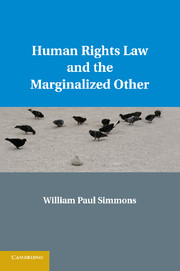Book contents
- Frontmatter
- Brief Contents
- Contents
- Preface
- Introduction
- Part I Deconstruction of Human Rights Law
- Part II Phenomenology of the Saturated Other
- Part III Human Rights of the Marginalized Other
- 5 Learning to Learn from the Voice of the Other
- 6 Self-Ascription by the Marginalized Other in Asylum Law
- 7 Heteronomic Rights and Duties
- Conclusion Working with the Marginalized Other to Deconstruct and Reinvigorate Human Rights Law
- Bibliography
- Index
7 - Heteronomic Rights and Duties
from Part III - Human Rights of the Marginalized Other
Published online by Cambridge University Press: 07 October 2011
- Frontmatter
- Brief Contents
- Contents
- Preface
- Introduction
- Part I Deconstruction of Human Rights Law
- Part II Phenomenology of the Saturated Other
- Part III Human Rights of the Marginalized Other
- 5 Learning to Learn from the Voice of the Other
- 6 Self-Ascription by the Marginalized Other in Asylum Law
- 7 Heteronomic Rights and Duties
- Conclusion Working with the Marginalized Other to Deconstruct and Reinvigorate Human Rights Law
- Bibliography
- Index
Summary
This chapter further translates the phenomenology of the Saturated Other into the language of human rights law, that is, the language of legally enforceable rights and duties. I argue that the content of human rights law needs to be fundamentally expanded and redefined, but this should not be done a priori by scholars (including the present author), activists, or attorneys; this should be directed by the Marginalized Other. When the rights of the Marginalized Other take priority over Arendt’s call for a right to have rights (see Chapter 4), it follows that the Other should have a legally enforceable right to define his or her rights, which would include the right to determine a hierarchy of rights, that is, to determine which rights are most fundamental. I will label rights developed in this fashion heteronomic rights, etymologically meaning rights based on a law (nomos) of the Other (heteros). The establishment of rights hierarchies based on a law of the Other will lead to what I call heteronomic tiered scrutiny, where more fundamental rights, as established by the Other, will require the strictest scrutiny as to whether they may be infringed by the hegemonic system. To self-ascribe one’s identity (discussed in Chapter 6) and define one’s rights is to overturn the categorizations or interpellations of the hegemonic narrative and to begin to establish a new anti-hegemonic validity in which the Other assumes control of his or her proyecto de la vida (life project).
Concomitantly, the duties of states (and other institutions) are expanded and transformed by the phenomenology of the Saturated Other. Expanding on emerging models of affirmative duties in international law that rely on the tripartite duties to respect, protect, and fulfill human rights, I argue for what I call heteronomic duties for the Other. States and other actors have the affirmative duty to work with the marginalized to realize their proyectos de la vida. Because their proyectos are obstructed by the structural violence of the system, the state can be held accountable – in violation of human rights law – for creating and maintaining the structural violence that deprives the Other of his or her rights. States can be held legally accountable for perpetuating such structural barriers as illiteracy, gender discrimination, hunger, and disease. States must continuously critique all original and conserving violence, even of those institutions like human rights tribunals that are established to serve the Other. Because a hegemonic discourse, in the form of an invisible ideology, often facilitates the marginalization of the Other, the state’s affirmative duties must also include the duty to work with the Other as a social theorist to deconstruct the interpellation of the Other by the hegemonic discourse or, in Paulo Freire’s language, to work with the Other to raise their consciousness. Consciousness raising must not be an education in the hegemonic discourse but will require the suspension, as much as possible, of the invisible ideologies of the system. It requires facilitating the development of the marginalized Other’s episteme. The state is legally bound to learn to learn from the voice of the Other. If a state is found in violation of these norms, human rights institutions should issue reparations orders that require the state to work with the marginalized Other, and these orders should be overseen by the human rights institutions working hand in hand with the Other.
- Type
- Chapter
- Information
- Human Rights Law and the Marginalized Other , pp. 189 - 219Publisher: Cambridge University PressPrint publication year: 2011



